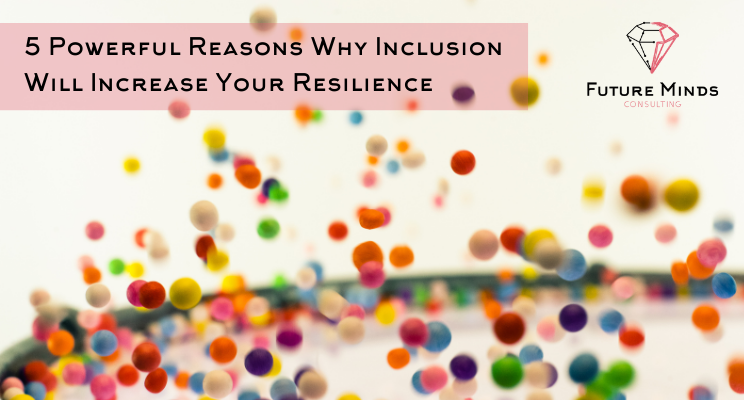Diversity, Inclusion, Equity, Belonging … they are not just buzzwords, they are tremendously hot topics for countless teams and organisations around the world.
In the last 12 months, companies have become increasingly present in the inclusion space. They started discussions with their employees, they organized events and training programs, they developed in-house initiatives… which is definitely a great start to acknowledge.
However, numerous initiatives still remain in the realm of creating awareness. At an organizational level, many actions are being implemented (sometimes with visible results, other times not as much), but at an individual level, one may find it difficult to grasp how to take concrete actions, how to learn from those, and whether they genuinely have a positive impact on their environment.
Change is all about […] the requirement to see those results directly impacting us.

As a Success coach, reflecting on inclusion practices makes me draw a parallel to any client who wants to create change in their own life. Change is all about finding the intrinsic motivation to move forward, and to develop new habits. And when I talk about motivation, what I really talk about is an underlying willpower to create a sustainable transformation – a deep-rooted need to link the results to our own purpose – and ultimately, the requirement to see those results directly impacting us, impacting our values, and impacting our day-to-day lives.
The reality? In our daily lives, inclusion is one topic amongst hundreds of others.
Imagine waking up in the morning – refreshed, full of good intentions, ready for a new day. You switch on the radio and listen to the latest update on recent racial unrest events. Would you care about being a more inclusive person?
Then you arrive at the office and your inbox is full. You go through your day, jumping from a challenge to another, from a crisis to a big client meeting, from a tough discussion to closing an important deal. By the end of the day, you’re thinking about what will be for dinner, bath time for the kids, starting a batch of laundry, not forgetting to call your relative for their birthday, anything else you will need to finish before going to bed… What’s more important to you right now?
We live stressful lives, and the reality of it catches up quickly, while other topics – such as inclusion – end up at the bottom of our priority list.

So what can we do to make our lives less stressful, more enjoyable, and and definitely feel more in control? In the uncertain world we live in, what can truly make a difference is to simply work on our resilience – the skills and abilities to prepare for, cope with, and bounce back from challenges and stressful situations.

How do we do that? – I hear you ask.
The answer: become a more inclusive individual!
Growing research shows that:
- diverse and inclusive individuals, teams, and organizations demonstrate much higher levels of resilience
- homogeneity inhibits a company’s ability to respond to challenges in a resilient manner, and
- diversity is key to coping with the uncertainties of the global economy
Resilient organizations are the ones who will end up not only surviving but more importantly thriving – in the coming decades.
Now let’s stop here for a second – and look back at our purpose, values, and personal goals we discussed earlier on.
If becoming a more inclusive individual is proving to have an impact on your resilience, what does that mean to you ultimately?
Resilient individuals are less stressed, more likely to enjoy what they are doing, overall mentally and physically healthier, and have a more positive outlook on life.
How would you feel if you’d arrive home more relaxed? What impact would it have on your children, your spouse, your friends…? How would you be if you were more in control of your day? How would you suddenly see the challenges thrown at you?
And as you can imagine, the impact is much significant than just us as individuals. By building up our inclusivity – and in time our resilience – we also create more resilient and performant teams and organizations. And resilient organizations are the ones who will end up not only surviving but more importantly thriving – in the coming decades.

So why should we invest in becoming more self-inclusive in the workplace? Here are 5 reasons why inclusion can allow individuals, teams, and organizations to flourish, grow, and perform better.
Reason #1. Inclusive individuals have a higher potential to perceive changes in their environment
Bringing diversity to a group ultimately means new information and ever-changing environments. When exposed to diversity, our brain develops new habits of looking more closely and deeply to the external environment as well as integrating new perspectives faster. To make the most out of it, those teams will need to ensure strong communication is happening to reap the benefits of diversity.
Reason #2. Inclusivity enhances creativity and innovation
Abundant research has shown already the correlation between diversity and inclusion, and its impact on creativity and innovation. This, in turn, means that teams and organizations become better prepared in complex settings as it enables individuals within the group to transform the information they gather (see Reason #1) into innovative solutions and proactive behaviors in the face of challenges, thus developing highly-resilient mindsets.
Reason #3. Inclusive employees grow a deeper understanding of adverse events
Building on the above, diverse and inclusive team members develop coping skills to immediately deal with stressful events and difficulties. Diverse teams can identify and integrate multiple interpretations of a single challenging situation thus a deeper understanding of the problems at hand and a more accurate evaluation of the risks involved.
Reason #4. Inclusive individuals are more likely to develop adequate and novel solutions
Adapting to uncertain environments is a key characteristics of resilient groups. Diverse and inclusive teams have a higher capacity in regrouping their heterogeneous knowledge and skills into a, not-only unique but also, suitable and positively-framed solution.
Reason #5. Inclusivity enhances psychological safety and impacts learning behaviors
Finally, by bringing on the table diverse experiences and inclusive managerial practices, the team benefits from the positive conflicts that arise. As their opinion gets greater value within the group, each team member grows their self-confidence both in their own abilities as well as in the way they interact with others. They feel more in control of their emotional states and will become less hesitant in pushing themselves out of their comfort-zone.

So next time, one of your peers wonders whether their efforts in the Diversity, Equity, and Inclusion space is indeed worthwhile, remind them that they may not see the results immediately, remind them that ultimately they are doing it not just for underserved and under-represented colleagues, but also for their own wellbeing. Speak to their ‘why’, and shine the light on inclusion as a way to live their values and achieve their purpose.
The impact on themselves, their team, and the rest of the organization is far greater than what they can imagine!
_______
Julien Lefort is a Success Coach and owner of Future Minds Consulting, a coaching, personal development, and Leadership & Organizational consulting firm providing global clients bespoke approach for their employees to transform and to become more confident, resilient, and empowered. Future Minds recently launched Inclusion Coaching for Resilience, a pioneering program that empowers leaders to become more inclusive, and to create and design actions for their teams and their organization.
Julien is also a member of the International Coaching Federation and holds a PCC (Professional Certified Coach) Certification and contributes in his spare time to the development of CoachingForEveryone a a dynamic new 501c3 nonprofit organization, designed to provide complimentary coaching and leadership services to traditionally under-resourced populations, particularly BIPOC young adults, K-12 educators, and nonprofit employees.

